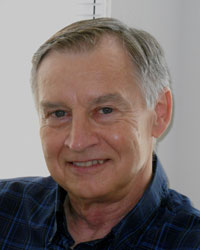Texas A&M's Johnson wins the ASBMB–Lipmann lectureship
, a distinguished professor at the Texas A&M Health Science Center’s College of Medicine, has been chosen to give the at the ľĹÓÎĚĺÓý annual meeting in April in Washington, D.C.
 |
|
“I am very honored to receive this award, and I thank ASBMB and the students, postdocs and collaborators who made this possible. Since Dr. Lipmann discovered EF-Tu, the focus of much of my early research, being named the Lipmann lecturer has extra significance for me.” |
“Art revolutionized our understanding of how complex protein machines operate,” says Vytas A. Bankaitis of the University of North Carolina at Chapel Hill School of Medicine, who nominated Johnson for the award. “The level of international acclaim and respect afforded to him by the larger scientific community is richly deserved on the basis of his outstanding research accomplishments over a distinguished career.”
The lectureship, which is awarded every two years, recognizes investigators who make conceptual advances in biochemistry, bioenergetics and molecular biology. Johnson was named the winner for pioneering the use of site-specific incorporation of non-natural amino acids into polypeptides and biophysical fluorescence approaches toward detailed elucidation of the dynamics and functional mechanisms of complex molecular machines.
After completing his undergraduate studies in chemistry at the California Institute of Technology in the 1960s, Johnson taught and coached football in Boston. He then went on to earn his doctorate in chemistry at the University of Oregon in 1973 and conduct postdoctoral work at Columbia University.
Thereafter, he joined the faculties of the University of Oklahoma in 1977 and Texas A&M University in 1994. Today, he holds the E. L. Wehner-Welch Foundation chair in chemistry at the College of Medicine.
To this day, Bankaitis says, the approaches Johnson pioneered remain the most powerful, yet accessible, tools to study the dynamics of complex biochemical systems. Additionally, he says, Johnson always has been “a gentleman scientist.”
“These days, it is all too common for researchers to be driven to prolific productivity by the motive of enterprise – the desire to be recognized, to win awards, to establish themselves personally,” he emphasizes. “While all of these motives are legitimate in proper measure, what is often lost is the proportion between mentorship and enterprise, between noble scientific pursuit and competition for the more material rewards, between a genuine desire to foster the independent careers of young researchers and exploitation of those talents.
“Art Johnson has always been a consummate professional – a great scientist, an effective and engaged mentor, a dedicated and effective teacher, and an outstanding citizen with respect to professional service.”
Enjoy reading ASBMB Today?
Become a member to receive the print edition four times a year and the digital edition monthly.
Learn moreGet the latest from ASBMB Today
Enter your email address, and we’ll send you a weekly email with recent articles, interviews and more.
Latest in People
People highlights or most popular articles

2025 ASBMB election results
Learn about the new president, secretary, Council members and committee members.

2025 PROLAB awardees announced
Seven early-career scientists receive grants to advance their research by working in North American labs.

Yu receives early career research award
He will receive $35,000 to fund his research on the proteotype and cell signaling.

Neurobiology of stress and substance use
MOSAIC scholar and proud Latino, Bryan Cruz of Scripps Research Institute studies the neurochemical origins of PTSD-related alcohol use using a multidisciplinary approach.

Hargrove recognized for leadership
He is among more than 50 individuals from the Iowa State University College of Liberal Arts and Sciences to receive recognition for their departmental dedication and contributions.

Teach, learn & transform biochemistry education
Meet the co-chairs of the 2025 ASBMB meeting on reimagining undergraduate education in the molecular life sciences to be held July 24–27, 2025 in St. Paul, Minnesota.

